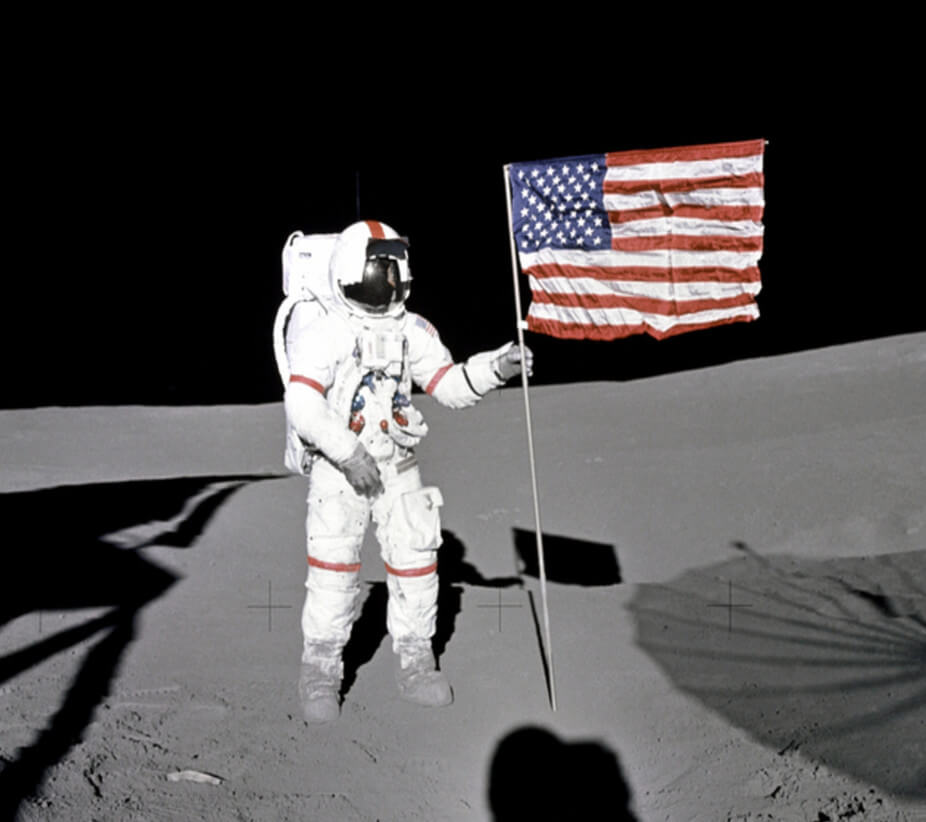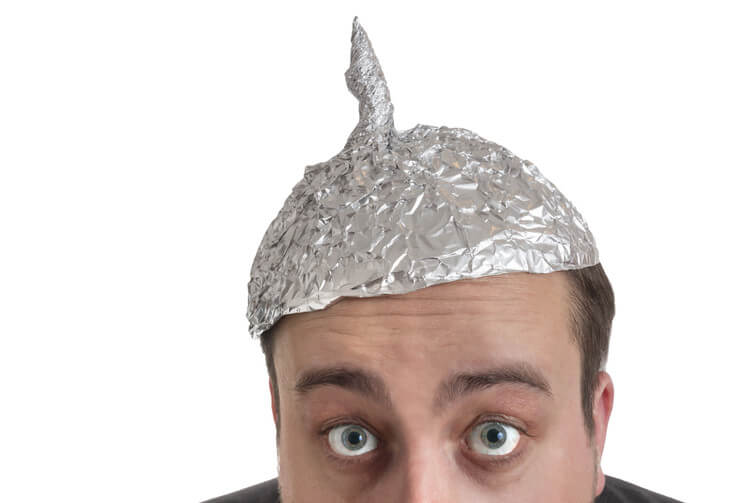- Get link
- X
- Other Apps

I'm sitting on the train with a group of football fans. They are in good spirits - their team certainly won - and occupied all the vacant seats around me. One of them raises the discarded newspaper and chuckles, voicing the latest "alternative facts" that Donald Trump talks about. Very soon all the rest begin to express their thoughts about the love of the American president to conspiracy theories. This chatter quickly flows to conspiracy theories, and I enjoy the way football fans cruelly mock the supporters of the flat Earth, chemistry mema memories and so on.
So begins his story professor of chemistry Mark Lorch on The Conversation.
And suddenly a lull comes in the conversation, and someone wedges in with a new message: "Perhaps all this is nonsense, but do not say that you believe everything that the yellow press feeds us. Take, for example, landing on the Moon - this is an obvious falsification, and not the most successful. I read in the blog that not a single photo shows even stars! ".
To my surprise, the speaker is given new "evidence" in favor of hoaxing the landing on the moon: inconsistent shadows in the photos, a fluttering flag, when on the Moon there is not even a slight breeze, who shot Neil Armstrong coming to the surface when there was nobody to hold a candle.
A minute ago they seemed rational people, able to evaluate the evidence and reach a logical conclusion. But now everything has gone upside down. So I take a deep breath and decide to join the conversation.
"In fact, all this can be easily explained."
They look at me with horror: the stranger ventured to intervene in their conversation. I continue, without stopping, throwing out on them facts and rational explanations.
"The flag did not flutter in the wind, it just moved as Buzz Aldrin put it into motion. The photos were taken during the lunar day - obviously, the day of the stars is not visible. Strange shadows - this is because of the wide-angle lenses, which they then used, they distorted the photos. And no one took off the Nile, descending the stairs. On the outside of the lunar module, a camera was installed, which took off his giant leap. If this is not enough, then the last nail in the coffin of this evidence was provided by the Lunar reconnaissance orbiter, or rather, its landing site images, where it is possible to clearly see the traces left by the astronauts since they roamed the surface.
"Done!", I thought to myself. But it turned out that I did not convince my listeners. They attacked me, giving out more and more ridiculous evidence. The director was Stanley Kubrick, the main character died under mysterious circumstances ... and so on.
The train stopped, and although the stop was not mine, I took the opportunity and escaped. And while I walked slowly along the platform, my mind was swarming with thoughts about why the facts so badly change the opinions of erring people.
The simple answer is that facts and rational arguments do not change people's beliefs very well. Because our rational brains are stitched throughout evolution along and across. One of the reasons why conspiracy theories come up with enviable constancy is our desire to provide the world with a structure and an incredible ability to recognize patterns. One recent study has shown a correlation between the desire to see the structure and the propensity to believe in conspiracy theories.
Take, for example, this sequence of zeros and ones:
0 0 1 1 0 0 1 0 0 1 0 0 1 1
Do you see the pattern? It is possible - and you are not alone. A quick survey on Twitter, reminiscent of another, more serious study, shows that 56% of people agree with you - even if this sequence was created by me during the coin flip.
It seems that our need for structures and our skill in recognizing regularities can be hyperactive and lead to the fact that we notice patterns - constellations, clouds resembling dogs, and vaccines that cause autism - where they simply do not exist.
The ability to see patterns was certainly a useful trait for survival in our ancestors - it's better to err on the part of a predator than to miss out on the real big hungry cat. But throw this same trend into our information-rich world - and you will see non-existent links between cause and effect - conspiracy theories - everywhere.

Peer pressure
Another reason why we are inclined to believe conspiracy theories is that we are still social animals and our status in society is much more important (from the evolutionary point of view) than rightness. Therefore, we constantly compare our actions and beliefs with them from our peers, and then we change, adjusting ourselves. If our social group believes in something, most likely, we will follow the herd.
This effect of social influence on behavior was well demonstrated in 1961 in an experiment with a crossroads conducted by American social psychologist Stanley Milgram and his colleagues. The experiment was simple (and funny) enough that you can conduct it yourself. Just find a busy intersection and look at the sky for 60 seconds.
Most likely, few will stop and check what you are looking at - in this situation, Milgram found that only 4% of passers-by joined. Now ask your friends to join you and your observations of the sky. As the group grows, more and more strangers stop and look up. By the time the group scored 15 people staring into the sky, about 40% of onlookers stopped and tilted their heads. You probably saw the same effect in action in the markets when you find yourself at the stand around which the crowd gathered.
This principle applies equally to ideas. The more people believe in information, the more likely we will perceive it as truth. And if, thanks to our social group, we are strongly influenced by a particular idea, it is built into our worldview. In short, social proof is a much more effective method of persuasion than evidence based evidence. Therefore, this kind of evidence is popular in advertising ("80% of mothers recommend").
Social proof is just one of many logical errors that make us ignore facts and evidence. A related problem is the bias towards data, the tendency of people to seek and accept data that supports their point of view, ignoring all others. We all suffer from this. Just remember when you last listened to the debate on the radio or television. How convincing did you find the argument that was at variance with your point of view compared to the other?
Most likely, regardless of the rationality of either party, you largely rejected the arguments of the opposition and applauded those with whom they agreed. Bias in confirmation also manifests itself in the tendency to choose information from sources that already agree with your point of view. Therefore, your political beliefs will surely determine your favorite news channels.
Of course, there is a belief system that recognizes logical errors, like the above, and tries to smooth them. Science, by repeating observations, turns an anecdote into data, reduces bias due to bias, and agrees that theories can be updated in the face of evidence. This means that you can edit the core itself. But the bias in confirming the data is our common scourge. The famous physicist Richard Feynman described the funny example, which was born in one of the most stringent fields of research, particle physics:
"Millikan measured the charge of an electron in an experiment with falling drops of oil and received an answer, which, as we now know, is not entirely correct. He's not quite right, because he had the wrong value of the viscosity of the air. It is interesting to look at the history of electron charge measurements after Millikan. If you build their time function, you'll find that this one is slightly larger than Millikan's, and the next is slightly larger than the previous one, and the next even more until they finally reach the higher number. "
"Why did not they immediately realize that the new number was higher? This is something the scientists behind this story are ashamed of. Because it is obvious that they acted as follows: when they received a number that was much higher than Millikan's, they thought that something went wrong and tried to find the cause of the error. When they got a number close to the millikan's size, they put up with it. "
Errors that destroy myths

Perhaps you will choose the approach of popular media and take a look at the fallacies and conspiracy theories, acting as the destroyer of myths. Comparison of myth with reality seems a good way to compare fact and lie side by side, that somewhere between truth was born. But this approach, again, is unsuccessful and produces a strictly opposite effect, as a result of which the myth becomes more memorable than the fact.
One of the most striking examples of this was seen in a study evaluating the booklet "Myths and Facts" on the subject of influenza vaccines. Immediately after reading the booklet, participants accurately remembered facts as facts, and myths as myths. But only 30 minutes later they all turned upside down in their heads, and the myths were remembered as "facts".
There is an opinion that the mere mention of myths helps to strengthen them. And over time, you forget the context in which you heard the myth - in this case during the debunking - and remained only with the very fact of this myth.
Worse still, the presentation of corrective information to a group with strong beliefs can actually reinforce its view, despite new information that should undermine it. New facts create gaps in our beliefs and are associated with emotional discomfort. But instead of changing our beliefs, we tend to justify ourselves and hate opposing theories that can shake our value systems. This is the so-called "boomerang effect" - and this is a huge problem if you decide to "treat" people from delusions.
For example, studies have shown that public information, designed to reduce smoking, alcohol and drug use, has the opposite effect.
Make friends and expose
So, if you can not rely on facts, how do you get people to abandon their conspiracy theories or other irrational ideas?
Scientific literacy is likely to help in the long term. By this I do not mean acquaintance with scientific facts, figures and methods. Instead, literacy is needed in a scientific way, for example, as analytical thinking. Studies show that the rejection of conspiracy theories associated with analytical thinking. Most people will never engage in science, but we face it daily and use it on a daily basis, so citizens need the skills to critically evaluate scientific judgment.
Of course, changing the nation's curriculum will not help with my argument on the train. For a quick response, it is important to realize that participation in the tribe will be extremely beneficial. Before you start a sermon, find a common language.
Meanwhile, to avoid the effect of reverse reaction, ignore the myths. Do not even mention or confirm them. Just note: vaccines are safe and reduce the likelihood of contracting influenza by 50-60%, that's all. Do not mention misconceptions, because they tend to be remembered better.
In addition, do not make opponents close, challenging their worldview. Instead, offer explanations that resonate with their previous beliefs. For example, conservative climate change deniers are much more likely to change their views if they also provide opportunities for business development in the interest of the environment.
And one more suggestion. Reinforce your point of view with stories. People get involved in narrative much more than in argumentative or descriptive dialogues. The stories link causes and effects, and drawing conclusions to which you want to fail will be almost inevitable.
All this does not mean that facts and scientific consensus do not matter. They have a very important, even the most important. But realizing the shortcomings of our thinking will allow you to present your idea much more convincingly. It is necessary to speak with a man in his language, the language of a friend, not of the enemy.
Instead of tying unconnected points and concocting a conspiracy theory, we need to demand proof from individuals making important decisions. Ask for data that can support their point of view. Partly also need to recognize our own bias, limitations and logical errors.
How would my conversation on the train pass if I listened to my own advice? Let's go back to the point where I noticed that everything turned upside down. This time I took a deep breath and leaned on my elbows.
"Hey, it's a good game. It is a pity that it was not possible to get a ticket. "
And now we are discussing the chances of the team this season. After a few minutes of chatter, I turn to the theory of the lunar conspiracy: "Look, I was thinking about the topic that you told about the lunar disembarkations. On some photos there were no stars? ".
He nods.
"So, maybe, there was a day on the Moon, because in the daytime on Earth we do not see any stars?".
"I did not think about it. May be so. It turns out that the whole note was lime. "
The article is based on materials .
- Get link
- X
- Other Apps
Comments
Post a Comment